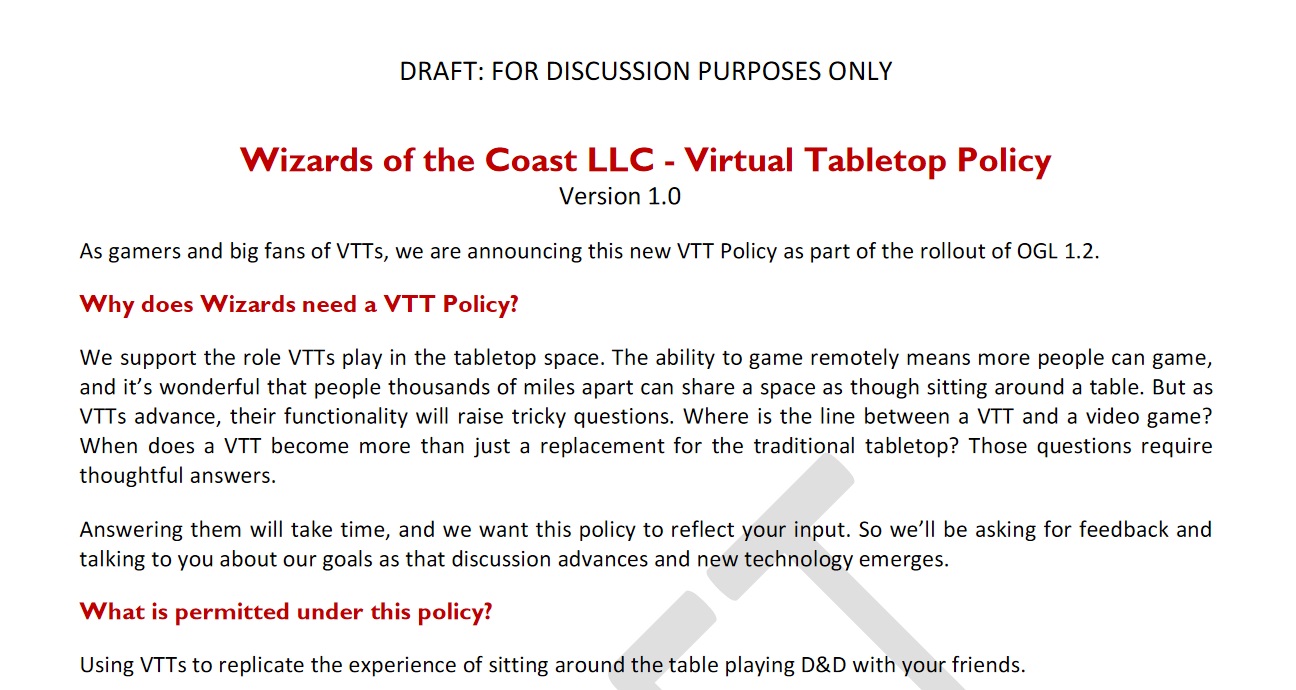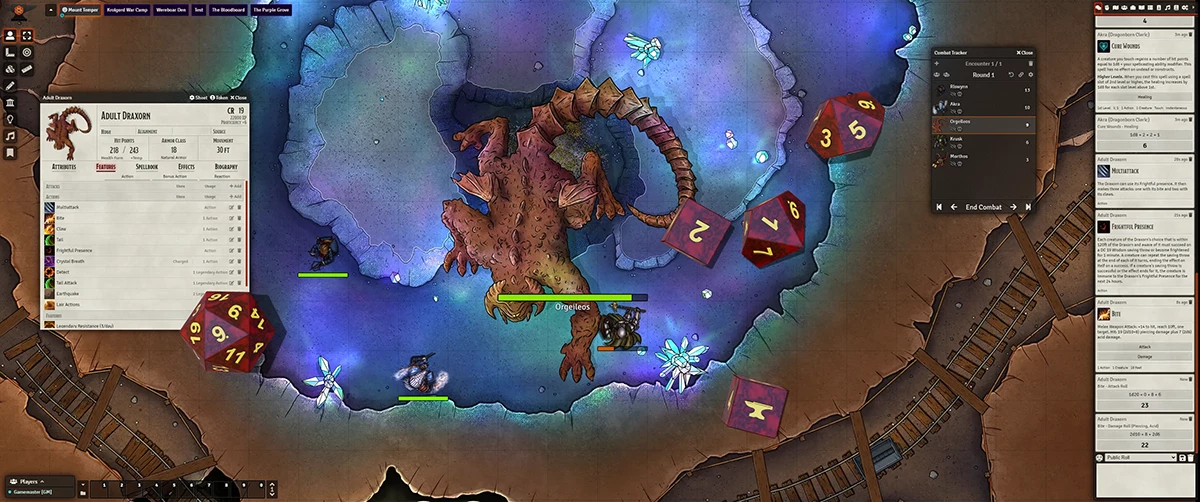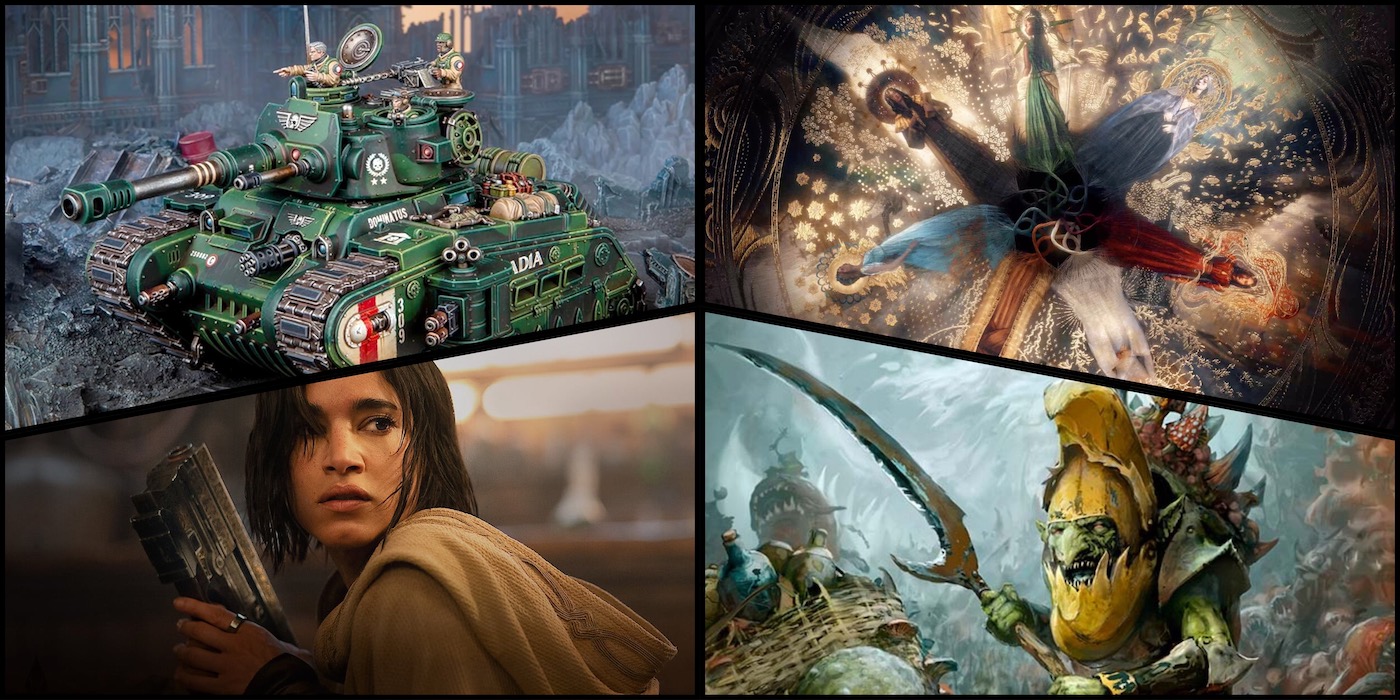Publishers Respond as WotC Takes Aim at Virtual Tabletops With OGL 1.2
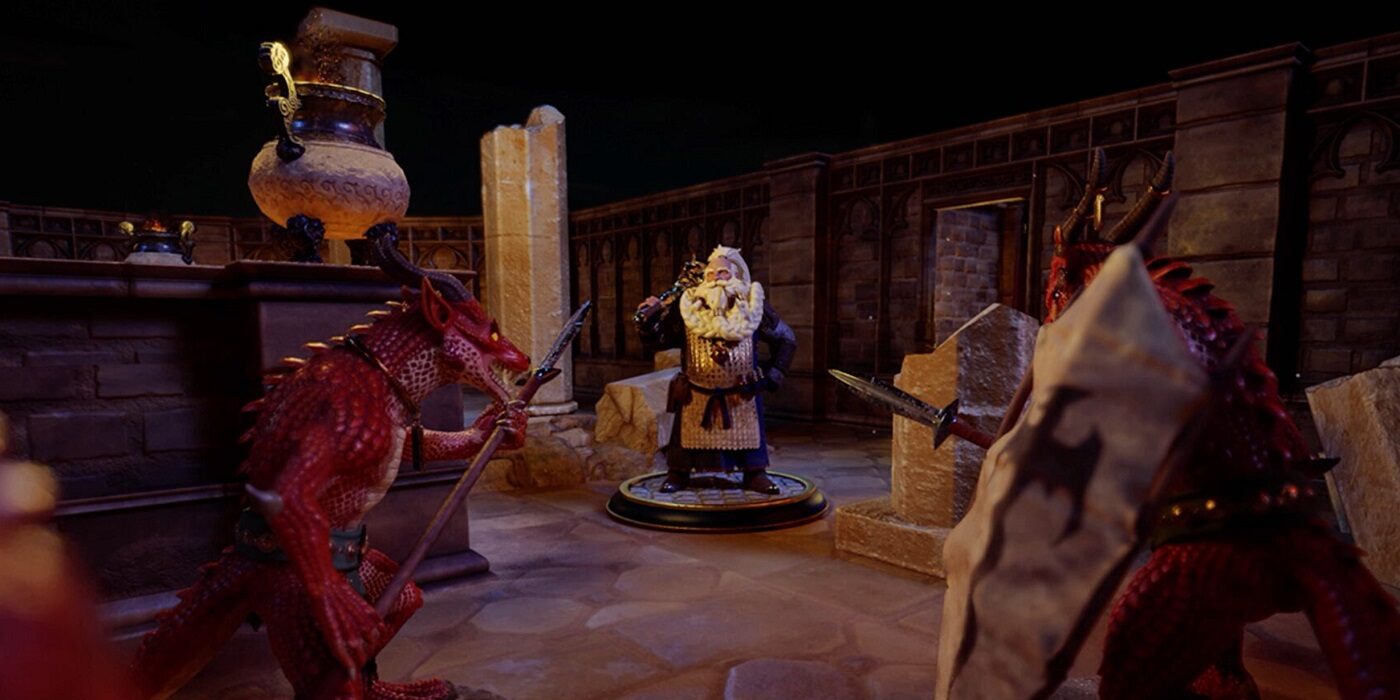
D&D’s proposed OGL changes are poised to have wide-ranging impacts across the tabletop industry — virtual tabletops in particular.
Included with the draft documentation of the OGL 1.2 is a copy of what Wizards of the Coast calls their Virtual Tabletop Policy. It’s included as the final and separate page of the draft. Per WoTC, it’s being announced as part of the rollout of the OGL 1.2
However, the policy has drawn fire from many of the extant virtual tabletop publishers, who point out that the policy contains “severe flaws.” With restrictions on including things like animated effects, and/or licensed depictions, it’s faced criticism for being both vague and restrictive.
What is WotC’s VTT Policy?
First, let’s take a look at Wizards of the Coast’s proposed new policy. Again, this is included in the OGL 1.2 draft documentation, found here. It’s the very last page in the document and is listed as page 1 of 1, which seems to imply that it’s separate from the OGL 1.2 somehow.
“As gamers and big fans of VTTs, we are announcing this new VTT Policy as part of the rollout of OGL 1.2.
We support the role VTTs play in the tabletop space. The ability to game remotely means more people can game, and it’s wonderful that people thousands of miles apart can share a space as though sitting around a table. But as VTTs advance, their functionality will raise tricky questions. Where is the line between a VTT and a video game? When does a VTT become more than just a replacement for the traditional tabletop?”
While Wizards of the Coast frames this as trying to distinguish between a “video game” and a “virtual tabletop” the answer is not so clear. Under their policy, only the vaguest permissions are given “using VTTs to replicate the experience of sitting around the table playing D&D with your friends.”
WotC goes on to point out that the calculation and dice rolling can all be automated, as can looking at “static SRD content.” But what isn’t covered is much of what makes Virtual Tabletops work in the first place. The dynamic effects have been a part of VTTs since the development of Roll20 or before, back in 2012.
“What isn’t permitted are features that don’t replicate your dining room table storytelling. If you replace your imagination with an animation of the Magic Missile streaking across the board to strike your target […] that’s not the tabletop experience.”
WotC goes on to state that VTT owners/operators have the same obligation for VTT content as any other website owner or operator has for copyrighted content.
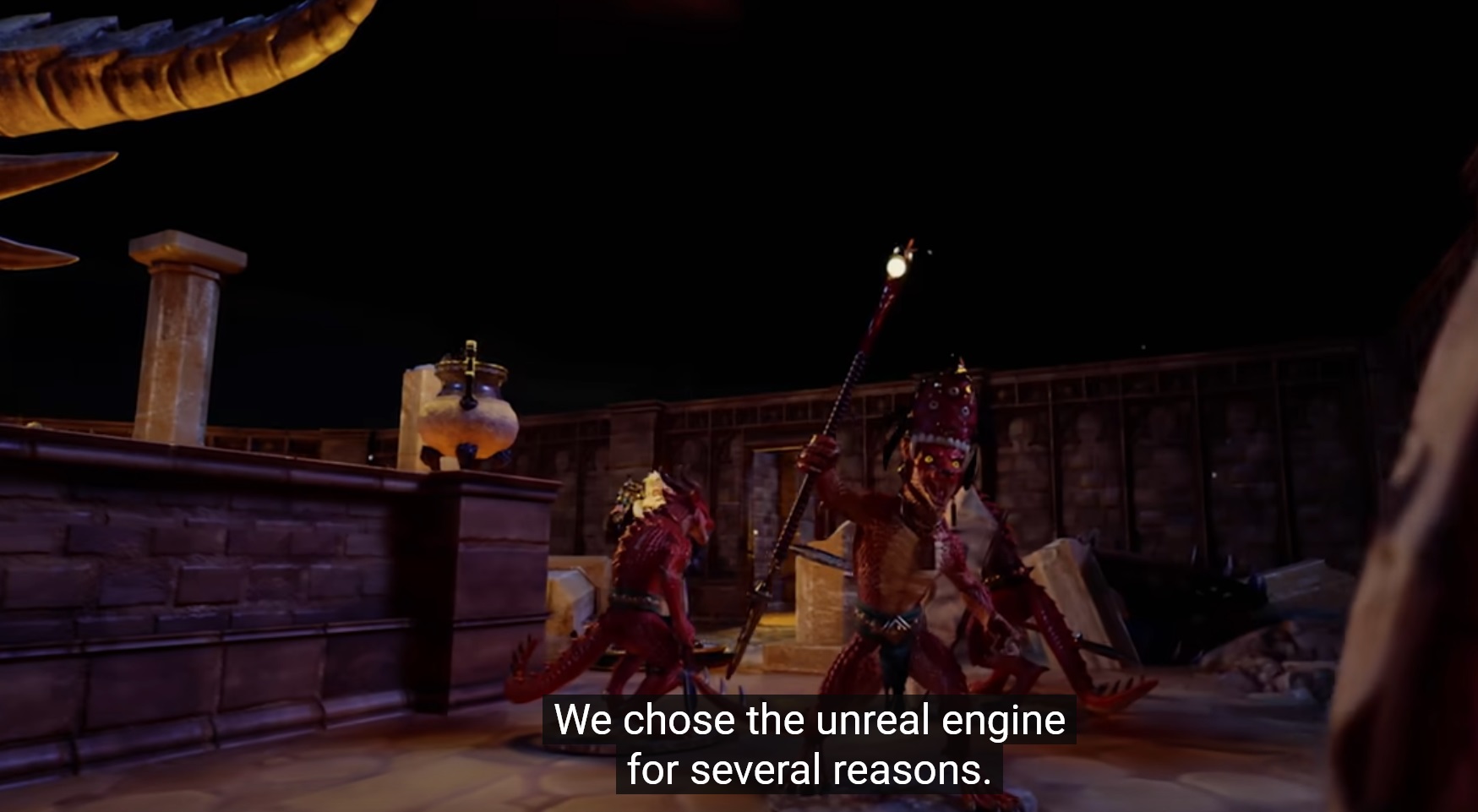
Image Credit: Wizards of the Coast – Wizards Presents
But they’ve come under community fire for this. Virtual tabletops have never been just about “replicating the experience of playing at home remotely.” They aren’t a new concept.
They’ve been around and iterated on since before 2012, when Roll20 launched a Kickstarter campaign for their table. There have been at least ten years’ worth of development on Roll20 since then. In 2013, the 3d Virtual Tabletop program brought in the idea of the first 3d virtual table. Which is exactly what WotC wants to roll out before long.
Features like dynamic lights, animated spell effects, moving terrain, hit point bars, condition trackers, and more have long been a part of virtual tabletops, since before WotC decided to get into the digital landscape. This is why many are up in arms about WotC’s open licensing changes.
Foundry Responds to WotC’s VTT Policy
We have feedback on the draft OGL 1.2. Without engagement from @Wizards_DnD with creators who would be accepting that license, a survey may be closer to an appeal to the community for permission rather than a desire to iterate together.
<https://t.co/Ue1xeV5b2x>#OpenDnD #OpenRPGAdvertisement— Foundry VTT (@FoundryVTT) January 20, 2023
Recently, Foundry published a response to the OGL 1.2:
“Yesterday, Wizards of the Coast shared a post Starting the OGL “Playtest” which introduces draft terms of a new Open Gaming License Version 1.2 (hereafter called OGL 1.2). This new license is intended to replace the prior Open Gaming License version 1.0a (OGL 1.0a) which has served and empowered the tabletop gaming industry since 2000.
These new license terms are shared for public discussion after several false starts. “OGL Version 1.1” was a far more restrictive license – to the extent of not being an open license at all. A FAQ which circulated regarding “OGL Version 2.0″ maintained many of the objectionable restrictions in version 1.1 that prompted community outrage. This latest version (OGL 1.2) is a constructive step, doing away with many of the most dangerous clauses of version 1.1, but it is still regressive compared to the original OGL 1.0a.”
They go on to call out specific problems with the OGL 1.2 as part of the “community discussion” WotC has invited in the matter. You can read those in their official statement. But they go on to call out the VTT Policy:
“This policy is severely flawed.
A crucial issue with this document is that it is a policy rather than part of the legal terms of the OGL itself.”
A key point that Foundry raises is that as a separate policy, it can be altered without changing the terms of the OGL 1.2. This means if Wizards of the Coast were to change their minds in the future, they could just as easily say that OGL content is not permitted with VTTs, especially not without prior agreements, which was one of the changes that we would be dealing with today, if not for the leak of the OGL 1.1.
“Just as print publishers have rightly insisted that the OGL must be irrevocable, the rights granted to software projects must also have a secure and trustworthy foundation to justify the investment required to create digital tools.”
Again, a key point for Foundry is WotC’s arbitrary distinction between a VTT and a video game. Foundry contends that differentiating isn’t necessary, but WotC might look to other options like:
“Are the actions of both player and non-player characters controlled by a human? Does the game experience provide a framework for collaborative storytelling? Can the gamemaster invent new rules on the fly? Surely virtual tabletops and video games alike may both have animation present in the way they communicate information visually to users.”
As Foundry points out, this still leaves all the power in WotC’s hands, to choose which software features are appropriate for a VTT and which aren’t. Because WotC has the biggest game in town. Even with community fracturing, look at the usage stats for any platform. D&D reigns supreme.
If a VTT wants to capture a wider audience, at this moment, D&D is one of their widest markets. So even if they don’t agree to it, WotC’s policy could have a huge potential impact. Because as WotC has stated, the future of D&D is digital.
The Future is Digital But Not Empty
But the future is not an empty one. Unlike the RPG industry almost fifty years ago, when D&D was an innovator and grew to be popular amid a big frontier. WotC is entering a field where many other competitors have already been developing their products.
Virtual tabletops like Roll20, which don’t even offer 3d modules by default have a number of bells and whistles. And that’s just to start. Look at tabletops like Alchemy:
Or TaleSpire:
Foundry puts it best:
If it is genuinely the desire of Wizards of the Coast to foster a space where virtual tabletop usage and operation is supported, [we] sincerely encourage Kyle and the WOTC team to reach out and reestablish a constructive dialog. VTT usage and digital content is clearly a key area of focus for the new OGL. Talking with the people who create and operate virtual tabletops should be a key area of focus for the conversation that determines the path forward.
More broadly, you are proposing a contract that you want creators, publishers, and virtual tabletop operators to accept. We urge you to consult with the parties who would agree to those terms, otherwise this process more closely resembles an appeal to the community for permission than a desire to iterate together.
If the future is digital, will it also be open?

